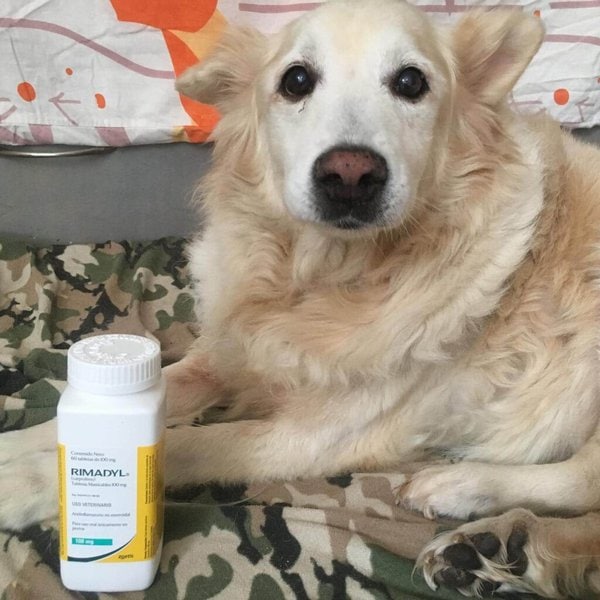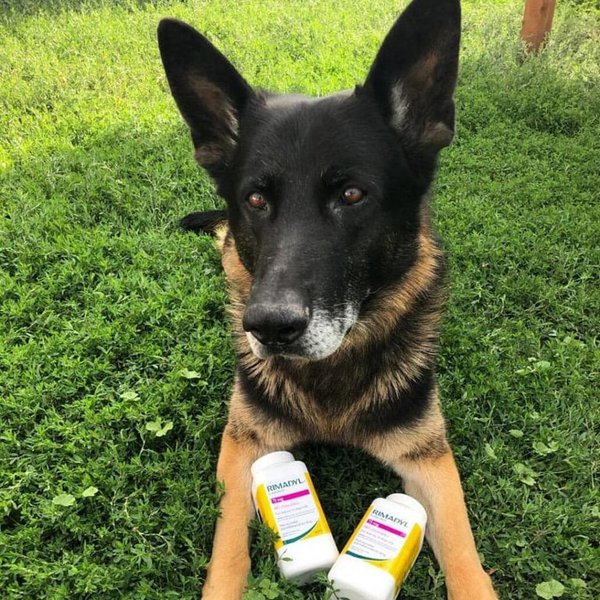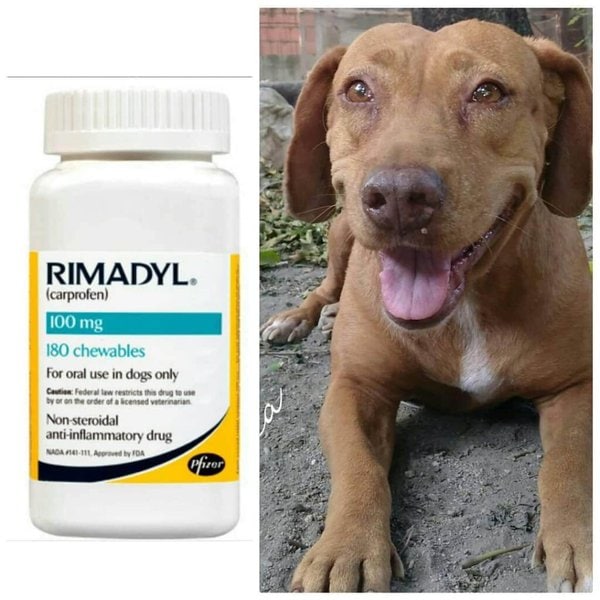If your pooch suffers from chronic pain, you are probably familiar with Rimadyl. This canine painkiller is prescribed by vets for pain management, inflammation, and fever.
But just how safe is Rimadyl for your dog? Rimadyl is a Non-Steroidal Anti-Inflammatory Drug (NSAIDs) for canines. Rimadyl is safe for dogs when administered as prescribed by the vet. NSAIDs like Rimadyl typically have fewer side effects than steroids. This makes them safe for long-term use in chronic conditions such as canine osteoarthritis. Rimadyl is also used to treat inflammation, postoperative pain and to reduce fever.
Rimadyl is highly effective in getting rid of pain and making your pooch feel better. However, like any other drug, understanding the best dosage and possible side effects of Rimadyl is imperative. So, if you’ve been wondering if Rimadyl is safe for your dog, let’s take a look at everything you need to know about this NSAID.
How Often Can I Give My Dog Rimadyl?
Rimadyl is one of the most widely prescribed drugs for canine ailments. Your vet will advise on the best dosage and course of treatment for your pup based on their condition.
Recommended Dosage
Rimadyl is usually available in the form of tablets, chewables or injections. The best form of Rimadyl for your dog will depend on their ailment.
The recommended Rimadyl dosage for dogs is 2 mg per pound of body weight administered once a day. In some cases, your vet may prescribe 1 mg per pound of body weight administered twice a day.
It is always important to stick to the prescribed dosage to avoid Rimadyl toxicity. If you give your dog too much Rimadyl they may develop sensitivity and develop symptoms of toxicity.
Long-Term Rimadyl Use
NSAIDs like Rimadyl have fewer side effects than steroids. This means that for long-term use, vets will usually prescribe Rimadyl in chronic conditions such as osteoarthritis.
When your vet prescribes Rimadyl for long-term use, they will check your pup’s liver condition regularly to ensure that there are no adverse effects from Rimadyl.
Long-term use of Rimadyl can also cause stomach issues and your vet may reduce the dosage in such cases or prescribe an alternative.
Rimadyl Overdose
In the form of chewable tablets, Rimadyl is liver-flavored and dogs find its taste very appealing. If you suspect that your dog has ingested Rimadyl or that you have exceeded the prescribed dose, keep a lookout for the following symptoms.
Symptoms of Rimadyl overdose or toxicity:
- Gastrointestinal symptoms include nausea, vomiting, diarrhea, and abdominal pain.
- Renal symptoms include dehydration, increased urination, vomiting, lethargy, and light-colored urine.
- Other symptoms include jaundice or yellowing of the skin, eyes, and gums.
If your pup exhibits any of these symptoms, consult your vet immediately for treatment.

What Does Rimadyl Do For A Dog?
Rimadyl is typically prescribed for the management of pain and inflammation either short or long term. Rimadyl acts in the following key ways:
- Rimadyl acts as an anti-inflammatory agent that helps to relieve swelling, redness, and other symptoms of inflammation.
- It has analgesic properties which means that if your dog has a fever, this drug will help to bring it down.
- It is an effective pain reliever that acts by blocking the production of certain chemicals that cause pain and inflammation in the body.
Due to its mode of action, your vet may prescribe Rimadyl for any of the following conditions.
Hip Dysplasia
If your dog has hip dysplasia, your vet may prescribe Rimadyl to help ease the pain and inflammation. Hip dysplasia is characterized by joint pain which can affect your pup’s mobility and cause pain.
Rimadyl is effective in the long-term management of chronic pain associated with hip dysplasia.
Osteoarthritis
When dogs suffer from osteoarthritis one of the symptoms of this condition is chronic pain. To manage this, vets will often prescribe an NSAID like Rimadyl to help ease the pain and inflammation.
Since osteoarthritis is a chronic condition, the safety of Rimadyl for long-term use makes it a suitable remedy for this condition.
Post-Surgery Recovery
If your dog just had an operation, Rimadyl can help in reducing postoperative pain. Your vet may prescribe Rimadyl for short-term pain or inflammation that may result from surgery. The length of administration will typically last until your dog recovers from the surgery.
In cases where Rimadyl is used for the management of short-term pain, your vet will assess the recovery progress to determine when to take your dog off the Rimadyl.

Is Rimadyl Harmful To Dogs?
Most drugs come with pros and cons and Rimadyl is no different. While Rimadyl is an effective pain killer, it may have some undesirable side effects. It is important to observe your pup while on any medication to note any adverse side effects.
If you notice that your pup is not tolerating Rimadyl well, notify your vet so they can adjust the dosage or recommend an alternative.
Here are some of the side effects of Rimadyl that you need to watch out for.
Vomiting
Rimadyl can upset your dog’s stomach resulting in symptoms such as nausea and vomiting. If your dog starts vomiting after taking Rimadyl, they may be having an adverse reaction to the drug. These symptoms of gastrointestinal distress may also be accompanied by abdominal pain.
Bloody Stool
Another side effect of Rimadyl observed in some dogs is bloody stools. NSAIDs tend to cause gastrointestinal bleeding and this ultimately results in bloody stools. If you notice blood in your dog’s poop after taking Rimadyl, consult your vet immediately.
Fatigue And Lethargy
Rimadyl may cause some dogs to experience general body weakness and lethargy. You may find that your pooch goes from active to lethargic once they start taking Rimadyl. If this happens, it can be a side effect of the drug and you need to seek your vet for advice.
Kidney Problems
Kidney problems usually manifest in the form of excessive urination, light-colored urine, or excessive thirst. If your dog exhibits any of these symptoms while taking Rimadyl, they may be having an adverse reaction to the drug.
Liver Problems
In rare cases, dogs may get Rimadyl toxicity after taking this NSAID. In such cases, signs of liver issues such as jaundice or yellowing of the skin, eyes, or gums will be observed.
Seek medical treatment immediately if your pooch shows any signs of liver problems after taking Rimadyl.

Can I Buy Rimadyl For My Dog?
You can buy Rimadyl in the form of chewable tablets or injectables for your dog. However, it is important to note that you need a prescription from a licensed veterinary doctor to buy Rimadyl. You should never give your dog Rimadyl unless your vet has specifically prescribed it.
When buying medication for your dog get a prescription from your vet. This will guide you on the safest and most effective dosage for your dog’s condition.
Rimadyl Costs
Rimadyl is an expensive NSAID. However, there are generics of Rimadyl referred to as Carprofen. These generics are much cheaper and maybe a more cost-effective option especially if your dog has been prescribed Rimadyl for long-term use.
Ask your vet about Rimadyl generics if you find the cost too prohibitive. In most cases, the generics are just as effective as Rimadyl and will achieve the same result.
Rimadyl Precautions
Rimadyl is not recommended for dogs with liver or kidney diseases since it may aggravate this condition. Always ensure that your vet is aware of any underlying conditions when prescribing medication for your dog.
Rimadyl should not be administered with other NSAIDs or corticosteroids as the drug interactions may result in adverse side effects. Let your vet know if your dog is on any other medication before they prescribe Rimadyl.
Pregnant and lactating dogs should not be given Rimadyl. This drug is also not recommended for dogs with gastrointestinal conditions because it can potentially aggravate stomach issues.
Before administering any drug to your dog, do always notify your vet of any sensitivities that your dog may have.

Related Questions
Is Rimadyl The Same As Tramadol? No, Rimadyl is not the same as Tramadol. Rimadyl is a Non-Steroidal Anti-inflammatory Drug used to relieve pain and inflammation while Tramadol is an opioid that can also be used for pain relief. Tramadol and Rimadyl can sometimes be administered together to manage pain and inflammation.
How Long Does It Take For Rimadyl To Leave Dogs’ System? Rimadyl takes 8 hours to leave a dog’s system. Rimadyl has a half-life of 8 hours which is the amount of time it takes from administration to go through the dog’s body and get eliminated. When Rimadyl is administered intravenously it takes 11 hours to leave the dog’s system.
What Is The Safest Anti Inflammatory For Dogs? Rimadyl is the safest anti-inflammatory for dogs. Rimadyl or Carprofen is a non-steroidal drug. This means that it has none of the negative side effects associated with steroids. Due to its safety profile, Rimadyl can be used in the long-term management of pain in chronic conditions.





